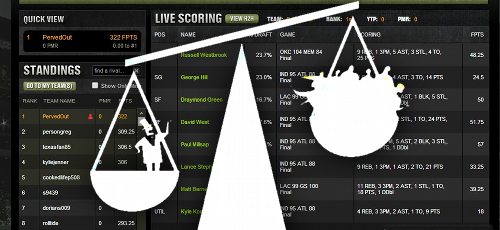 New data has shed further doubt on the long-term viability of the daily fantasy sports (DFS) industry.
New data has shed further doubt on the long-term viability of the daily fantasy sports (DFS) industry.
Ed Miller, author of numerous books on poker strategy, and Daniel Singer, senior adviser of the McKinsey & Company Global Sports and Gaming Practice, published an article on Sports Business Journal addressing “the curse of too much skill.” Specifically, the pair voiced concerns about how a miniscule percentage of DFS players are using technological aids to capture the bulk of player winnings.
According to the authors’ stats, which Miller said were “collected by a third party from publicly available pages,” the overwhelming majority (80%) of DFS players were considered minnows, responsible for only around 8% of total DFS entry fees. Over the first half of the 2015 Major League Baseball season, these minnows spent an average of $49 in entry fees, half of which they ended up losing.
Meanwhile, just 1.3% of all DFS players accounted for 40% of fees and won 91% of player profits. The bulk of this upper echelon spent an average of $9,100 on fees, on which they realized profits of $2,400, while accounting for 23% of all fees and 77% of the profits.
The top 11 players of this 1.3% are the true DFS sharks, spending an average of $2m in entry fees and realizing profits of $135k apiece. These 11 players accounted for 17% of all entry fees.
On the flip side of that equation, 5% of players are DFS’ ‘big fish,’ accountable for 36% of entry fees and 75% of all losses. These whales spent an average of $3,600 entering DFS contests, losing about $1,100 in the process. (The remaining 16% of fees were contributed by another 13.7% of players.)
 The authors contend that the minnows will happily continue to chug along losing $10 per month in perpetuity. The same can probably not be said about those unlucky whales, unless they’re masochists with more money than brains, yet they appear crucial to the health of the DFS economy, particularly if DFS operators want to keep on spending double-digit millions per week on TV ads).
The authors contend that the minnows will happily continue to chug along losing $10 per month in perpetuity. The same can probably not be said about those unlucky whales, unless they’re masochists with more money than brains, yet they appear crucial to the health of the DFS economy, particularly if DFS operators want to keep on spending double-digit millions per week on TV ads).
The authors attribute the sharks’ success to the use of sophisticated technological modelling tools and the ubiquity of sharks in all DFS tournaments. It’s not uncommon for sharks to enter nearly every single DFS contest on a particular site, creating a scenario for minnows that the authors likened to Neo in The Matrix Reloaded, forced to contend with hundreds of Agent Smiths at the same time.
The authors suggest a number of potential fixes, including limiting the number of contests a player can enter on any one day, a restriction that FanDuel has already imposed. However, Miller says sharks will eventually adapt to this restriction by facilitating syndicate play.
A few months back, DraftKings’ decision to officially permit the sue of automated software for certain tasks on its site was greeted with howls of outrage by the DFS rank-and-file, who saw their own chances of success being further diminished. While RotoGrinders subsequently issued a free (for the moment) scripting tool, those modeling tools employed by sharks will continue to give them the necessary edge.
Earlier this week, poker aficionado Kim Lund (@infintieedgekim) posted a blog wondering if the DFS industry would “repeat online poker’s mistake.” Lund said DFS appeared to be “cultivating a pro culture” that would ultimately lead minnows to “conclude that their role to play is that of cannon fodder.”
Lund observed that while many DFS fans played simply for the love of it, they also did so with the expectation of winning now and then. “Feeling that you have a shot even if you’re the underdog is an absolute must for anyone to put money on the table.” Lund noted that DFS is doing a bang-up job of attracting new players but “the risk is that he or she will bust through their budget so fast that they burn out.”
